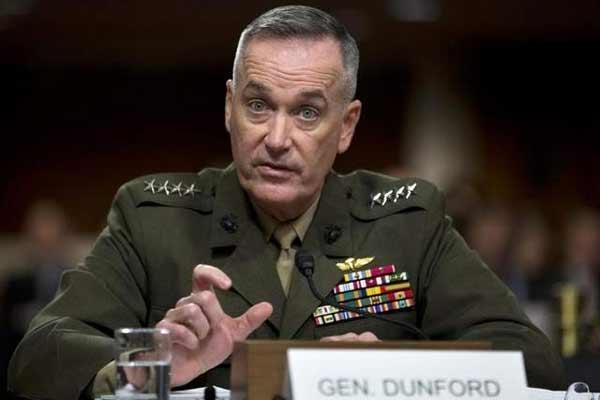Marine Gen. Joseph Dunford last weekend became the first Joint Chiefs chairman ever to address the United Nations, where he called for more women in U.N. peacekeeping missions.
"I'd like to highlight there's a growing need for women to serve as peacekeepers," said Dunford, who as Marine Corps commandant was one of the last holdouts to opening all combat positions to women in the U.S. military.
"During my deployments to Iraq and later as the commander of the International Security Assistance Force in Afghanistan, I learned firsthand that women are an important part of an effective response to today's challenges," Dunford said Saturday at a forum on peacekeeping at U.N. headquarters in New York.
Related stories:
After Losing Combat Debate, Corps Sells Gender Integration to Marines
Bill Requiring Women to Register for the Draft Passes Senate
"Women not only add to the capability of our own forces, they have a unique ability to connect with local populations in areas of instability," Dunford said.
The U.N. currently funds at more than $7 billion annually numerous peacekeeping missions worldwide, including in Abyei (Sudan), the Central African Republic, Côte d’Ivoire, Cyprus, Darfur, Democratic Republic of the Congo, Golan, Haiti, Kosovo, Liberia, Mali, Somalia, South Sudan and Western Sahara.
Current peacekeeping operations involve more than 121,000 troops, police and civilians in increasingly dangerous efforts to cope with the chaos of failing states. Since 1948, more than 3,700 UN peacekeepers have been killed on missions.
Dunford said it was a "personal priority for me" to improve the discipline and professionalism of the missions, which have been plagued by charges of corruption and sexual assault against local populations.
"I think it's clear to all of us that the U.N's record in this area has been mixed -- and there's a lot of reasons for that mixed record -- but chief among them is the hard reality that U.N. peacekeeping missions deal with some of the most challenging and protracted issues on the planet," he said.
"But while many of the challenges are due to the nature of the conflicts, there's other challenges that should concern us all. Problems of ill-disciplined units conducting criminal acts, including sexual assault, problems with corruption, and shortfalls in equipment cannot be blamed on the environment," he said.
Dunford said the need for U.N. peacekeeping missions was likely to grow to meet the challenges of spreading global terrorist networks and transnational threats.
"No nation today can turn away and consider violent extremism somebody else's problem. We have many examples of how the fight can follow us home from fragile states in the form of terrorist acts and the mass migration of those seeking to escape violence," Dunford said.
"Just as the character of war has changed, the nature of U.N. peacekeeping missions has changed," the general added. "Today, two-thirds of all blue-helmeted peacekeepers are serving in active conflict areas, a trend that in my estimation is likely to continue well into the future."
-- Richard Sisk can be reached at Richard.Sisk@Military.com.



























